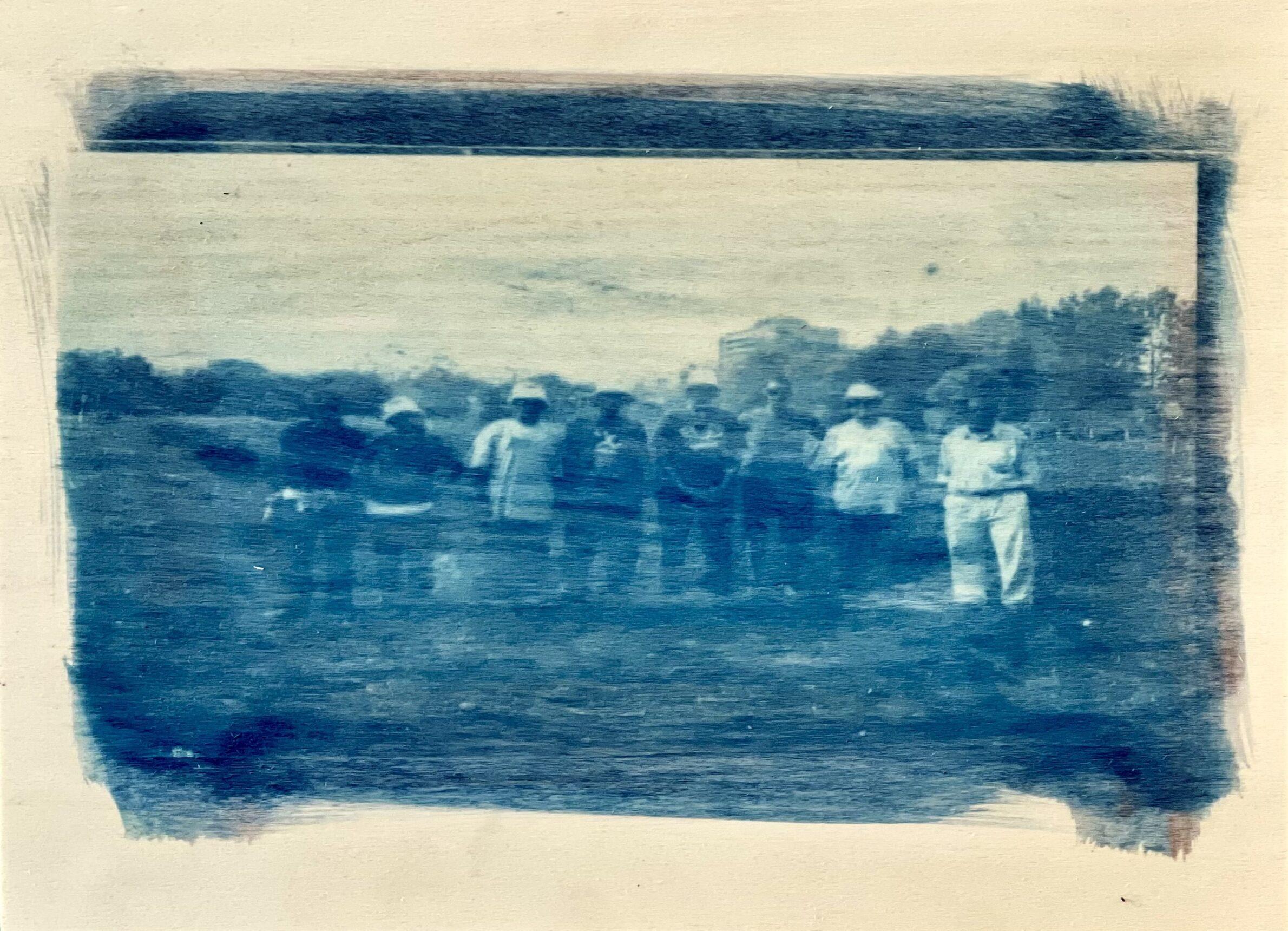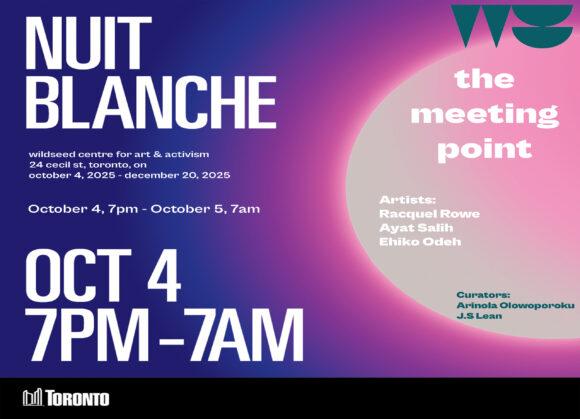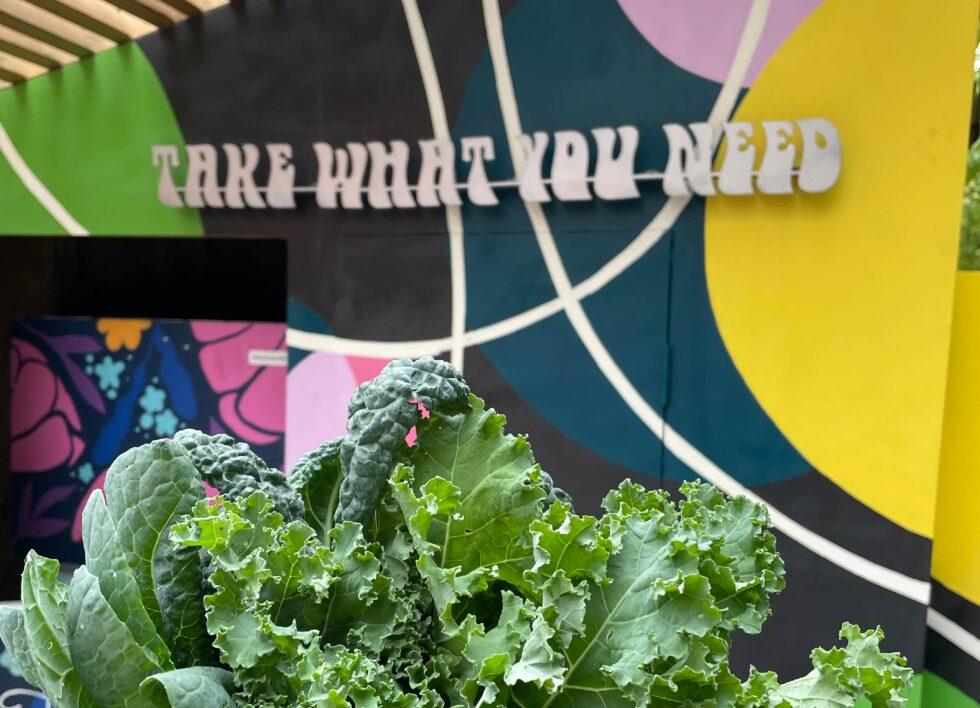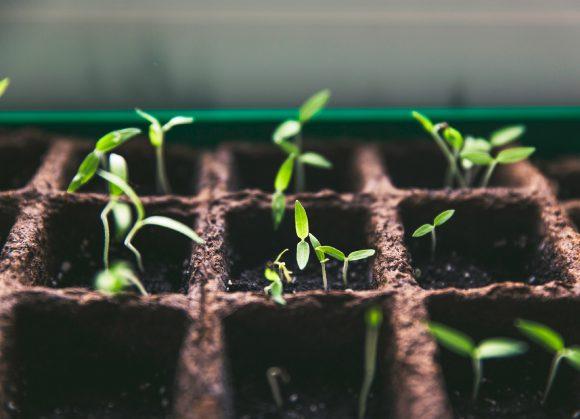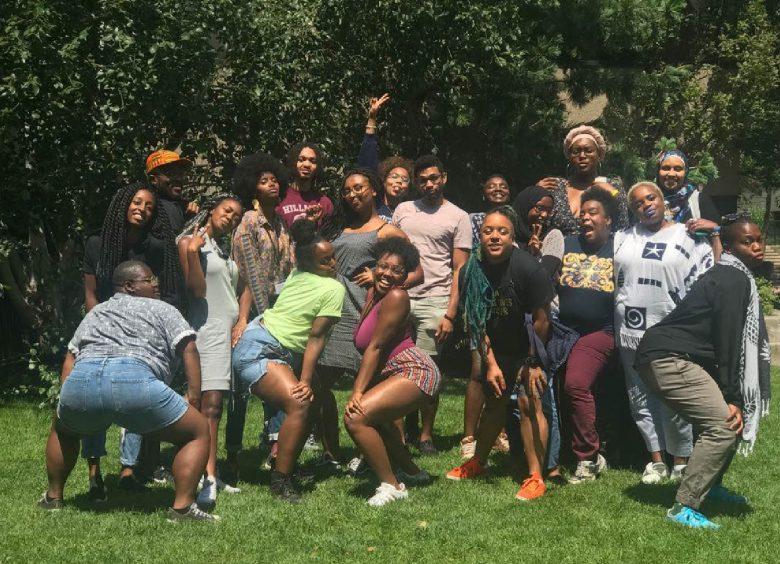Program — Nuit Blanche 2025 – The Meeting Point Exhibition
Effective Dates:
Oct 4, 2025 — On-going
The Meeting Point
Being Black in Canada is a viscerally unifying yet disjointed experience. Cut from a patch of the fabric of one society and affixed into the textile of another, we are wholly intertwined with one another. For many of us and our ancestors, what began as an unintended journey, charted against our will by colonial powers, established ruptures that created multiple roads, some taken and some deserted, all converging at the meeting point.
The Meeting Point is a group exhibition considering the richness, breadth, and complexity of contemporary Black diasporic life. Rather than a final or fixed destination, the meeting point is imagined here as varied, indeterminate, and deeply social formations through which the spiritual, material, cultural, and political aspirations of Black people are preserved in the wake of movement and displacement. These spaces are discovered in the course of their making, whose forms, never stable or predetermined, are always constituted in practice.
The shifting, dispersed nature of these formations speak not only to the scale and pace of movement, but also to the continuous renegotiations of what departure and arrival means, what demands they place on individuals, on families, and on communities. The works gathered here emerge from traditions of Black diasporic thought that challenge the fixity of such concepts. They push beyond the polarity between an old home and a new home, asking instead how homes are made and unmade, how cultural practices are preserved and transmitted, what structures permit belonging, or deny it, and the limits of belonging altogether.
In his book The Meeting Point, Austin Clarke reflects on the tensions and harmonies that emerge when cultures converge. Similarly, Paul Gilroy’s Black Atlantic wrestles with the duality of consciousness across geographies, home and abroad, both sides of the ocean. These texts remind us that Black Canadian identity can be both fluid and rigid, complex yet converging. Continental African, Afro-Caribbean, Afro-Latinx and Afro-Arab immigrants, Afro-Indigenous persons, descendants of enslaved Black people on Turtle Island, and the wider Black Diaspora are at once separate and together. A shape-shifting form never quite landing in singularity, but dynamically expanding, with flashes of overlap cutting across national boundaries. This is one of many meeting points.
Identity-informed discourse is radical for a people whose histories and heritages have been usurped. It insists on an investigative walk backward as a way forward, a form of resistance. This exhibition aims to invite audiences to examine weaving identities in flux, held in time through observation, symbolism, and revisiting histories.
Particular attention here is given to sustenance, labor, and resilience, forces that bind community across distance. Racquel Rowe’s video works foreground matriarchal knowledge and the home as undervalued but vital sites of cultural and social reproduction in the Caribbean and Canada. In photographic documentations of ceremonies in her home in Sudan, Ayat Salih considers the gendered labors required to preserve and enrich communal life. Ehiko Odeh’s prints and installations draw attention to the significance of Black diasporic foodways and the necessity of food sovereignty in the struggle against oppression, dispossession, and precarity.
As a space of Black resistance and being, presenting this exhibition at Wildseed Centre acts as both translation and reflection. The Meeting Point is also an extension of Nuit Blanche’s theme of Translating the City, which represents navigating the shifting tenets upon which multicultural ideas are formed. It’s reflective of the cityscape, which itself continues to transform through the continuous movement of people, culture, and the Afrodiasporic identity herein. Each artist’s work intersects with the next, and the whole group arrives at a unifying and nuanced space.
The Meeting Point is thus not a conclusion, but a beginning. It is a call to observe the flux of Black Canadian identity, to acknowledge its multiplicities, and to recognize the quiet harmonies that emerge through rupture. It is where separate roads, taken and deserted, overlap and continue.
Co-Written by Curators, Arinola Olowoporoku and JS Lean
References:
Clarke, Austin. The Meeting Point. Vintage Canada, 23 Oct. 2012.
Gilroy, Paul. The Black Atlantic: Modernity and Double Consciousness. London, Verso, 1993.
Exhibiting Artists
RACQUEL ROWE
Racquel Rowe is a Barbadian interdisciplinary artist based in Southern Ontario whose practice, through video, performance, photography, and installation, examines ritual, memory, and diasporic identity; supported by major arts councils and holding degrees from Waterloo and Guelph, her work spans solo exhibitions such as “The Centre of the World Was the Beach” (Forest City Gallery, 2025) and “Saltwater Cures All” (Tom Thomson Gallery, 2024; Gallery Gachet, 2023).
EHIKO ODEH
Ehiko Odeh is a multidisciplinary artist from Lagos, Nigeria, her process is rooted in material transformation to evoke a sense of haze, ambiguity, bridging the organic with the archival as a mode of adaptation. Her work engages family history, food security, and coi@ure as reflections of economic change, while investigating globalization, ecology, herbology, and the poetics of space. Ehiko holds a Bachelor of Fine Arts degree and a minor in Creative Writing from OCAD University (2021), Her works have been exhibited at The Toronto Outdoor Art Fair (2025), Design TO Festival (2024), United Contemporary (2025), Meridian Arts centre (2025), The Artist project (2024 & 2025) Abbozzo Gallery (2024), Nicholas Metivier Gallery (2023), BAND Gallery (2019 & 2023). Her work was recently added to the Government of Ontario’s Art Collection (2025).
AYAT SALIH
Ayat Salih is a multidisciplinary artist and researcher whose work spans film, photography, and visual arts. Rooted in her multi-faceted identity as aSudanese woman, her practice explores the intersections of gender, class, culture, and diasporic experience. She views art as both survival and gesture, a way of capturing what is fleeting, obscured. Ayat is drawn to themes of intimacy, grief, social performance, and the mystical. Her work explores the interconnectedness of waking and dreaming worlds and documents overlooked traditions and moments. Her fascination with the human form lends to using the body as the site of gesture and memory. Her art ultimately seeks to uncover hidden processes and open new ways of living and imagining. She holds a BA in Media Production from Toronto Metropolitan University.
- Organizer(s)
- Arinola Olowoporoku
- Programming Manager
- arinola@wildseedcentre.com


